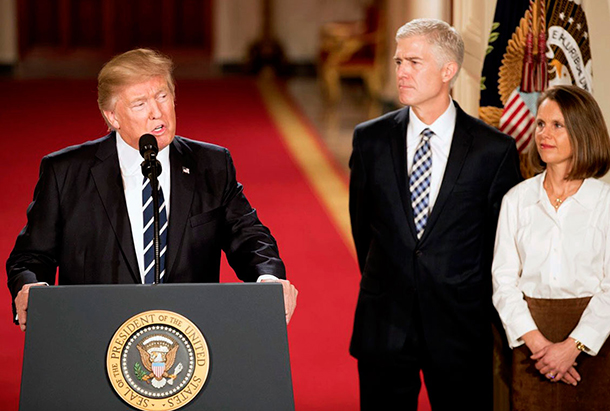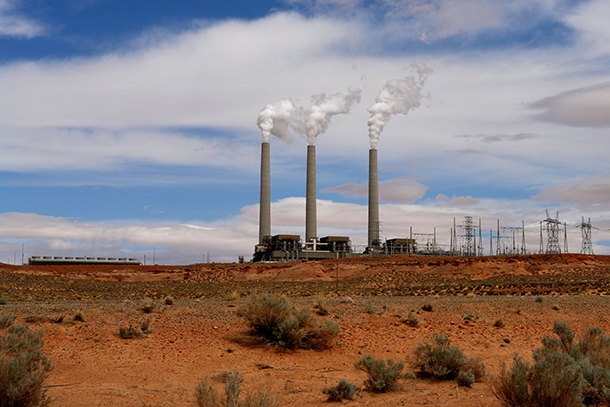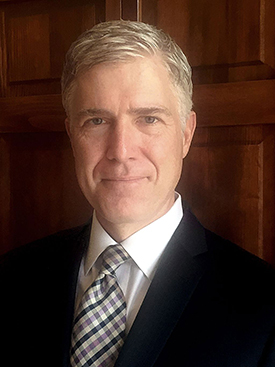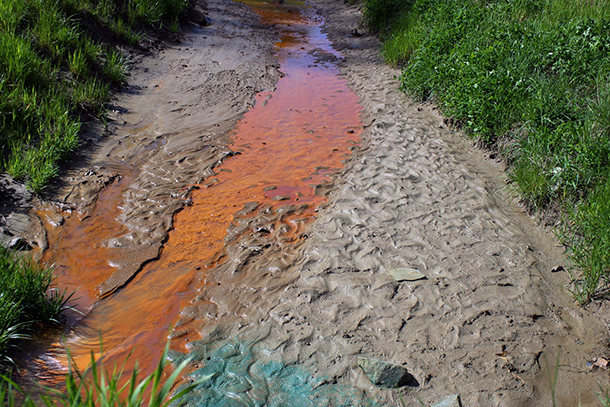How Green is Judge Gorsuch?
Air Date: Week of February 3, 2017

President Trump announces his nomination of Judge Neil Gorsuch to the US Supreme Court as the judge and his wife, Louise, look on. (Photo: Official White House photo, public domain)
Appellate Judge Neil Gorsuch, President Trump's nominee for the US Supreme Court, has not presided over many environmental cases, but his well-written and very conservative court opinions provide insight into what his appointment could mean for law in this area. Vermont Law School Professor Patrick Parenteau tells host Steve Curwood how Gorsuch's narrow interpretations of agency powers, as well as his time spent in the outdoors, could inform his findings if he is confirmed.
Transcript
CURWOOD: From the Jennifer and Ted Stanley studios at the University of Massachusetts Boston and PRI, this is Living on Earth. I’m Steve Curwood.
In these first days of the Trump White House, there has been plenty of chaos and questionable decisions and appointments. But, thanks to the guidance of the conservative Federalist Society, whose board includes establishment legal lions, the Trump Administration has nominated a top-ranked appellate judge for the US Supreme Court. Judge Neil Gorsuch of the 10th Circuit Court of Appeals is seen as a strong legal scholar who shares many of the views, but not the temperament, of the irascible Justice Antonin Scalia, whose death last year created the vacancy.
Vermont Law School Professor Pat Parenteau joins us to talk about how this conservative judge might approach environmental cases. Pat, great to talk with you again.
PARENTEAU: Nice to be here, Steve.
CURWOOD: So, tell me first, who is Neil Gorsuch as a judge and lawyer? Talk to me about his corporate practice before he went on the bench. And it seems like a lot of Democrats as well as Republicans seem to like him. What do you make of all that?
PARENTEAU: Yes. Well, everybody agrees he's very smart, he's well-qualified to be a Supreme Court Justice. He did do a stint in private practice, but he was also actually with the environmental division of the Department of Justice where he did win praise and respect from his colleagues there. He is generally in the mold of the late Justice Scalia, but I wouldn't call him a Scalia clone. In fact, I think he’s probably a step to the left of Justice Scalia, but also probably more a step to the right of Merrick Garland who was, of course, Obama's nominee.
CURWOOD: So, what do you think about his nomination? Should he be confirmed, what do you think it would mean for environmental laws and regulations?
PARENTEAU: It's hard to read him because he has not written that many major environmental cases. He is most known for his opposition to what we call the Chevron doctrine, which, of course, is the doctrine that defers to agency interpretations of ambiguous statutes. This is the issue that’s at the forefront in the Clean Power Plan litigation, and it's probably fair to say that Judge Gorsuch such would be very skeptical, like Justice Scalia was, of EPA's assertion of broad authority under a narrow provision of the Clean Air Act. So in cases where there's a major rule with major economic consequences, Judge Gorsuch is certainly going to lean towards the business side of the argument.

The US Supreme Court will likely make a ruling on the constitutionality of former President Obama’s Clean Power Plan in the next few years, assuming it is not withdrawn by the Trump Administration. Above, the Navajo Generating Station in Arizona is the largest single source of greenhouse gas emissions in the American West. (Photo: Alex Proimos, CC BY-NC 2.0)
The irony, of course, is that if anybody needs the Chevron doctrine to do what he wants to do, it’s Trump's choice to head the EPA, Scott Pruitt. If Mr. Pruitt wants to repeal Obama's environmental rules, he's going to need the Chevron doctrine to do that, and Judge Gorsuch sounds like he's not inclined to give a lot of weight to the agency's reinterpretation of statutory language. So, this doctrine cuts both ways; it may actually end up impeding the Trump administration's attempts to roll back environmental rules.
CURWOOD: What about that the Clean Power Plan? It's still, what, in front of the DC circuit court of appeals?
PARENTEAU: It is.
CURWOOD: Now, perhaps the Trump administration will it say doesn't want that to go forward. What do you think would happen?
PARENTEAU: Yes, they could move to voluntarily remand the rule, take it back, but my view is that the DC circuit, which heard arguments last year, by this point in time I think the court is probably fairly close to issuing a decision, and I doubt very much that they're going to appreciate having the Trump administration say, “Never mind, give us the rule back, we plan to repeal it”. I think the DC circuit is going to issue a decision, and there's a fair chance, not a certainty, that they may actually uphold the plan.
CURWOOD: So, what would happen in that case? I imagine that the incoming administration would appeal to the Supreme Court.
PARENTEAU: They would appeal to the Supreme Court. They might simultaneously seek to initiate a new rulemaking to repeal the rule. They can't just do it with the stroke of the pen. They've got to go through the full, what we call “notice and comment” rulemaking process, to repeal it. Or perhaps Congress will step in in the meantime and repeal the rule and maybe even amend the Clean Air Act to limit EPA's authority to promulgate rules like the Clean Power Plan, but there will definitely be a petition for review to the Supreme Court, regardless, frankly, of what the DC circuit does.
CURWOOD: So, let's go back to Judge Gorsuch. Some have called Neil Gorsuch a friend of fossil fuel companies and big business. How fair is that characterization of the judge, do you think?
PARENTEAU: You can discern a business friendly approach to questions, where environmental regulations impact industry. He is also known as quite an outdoorsman. He comes from Colorado. He's a fly fisherman. He's a skier and, in fact, he learned of Justice Scalia's death while he was skiing. So, he's a mixed bag, I think. He's definitely the kind of judge who looks to the text of the statute and doesn't try to read too much into it, but on the other hand, from the opinions I've seen he tends to follow precedent. He tends to think about the issues, and he writes very well. He tends to listen to opposing points of view. So, under the circumstances, given who's in the White House, he's probably the best we could've hoped for in terms of a pick for the Supreme Court at this point.

Judge Neil Gorsuch of the 10th Circuit Court. (Photo: United States Court of Appeals for the Tenth Circuit, public domain)
CURWOOD: And tell me about this renewable energy case that he ruled on that some environmental advocates say shows that this fellow has some plusses as well as minuses from their perspective.
PARENTEAU: Yeah, I think that he upheld Colorado's renewable portfolio standards from a challenge from an industry group that claimed that they were unconstitutional under what we call the Dormant Commerce clause, and the case involves some interesting facts. You can't extrapolate too much from his decision upholding the Colorado law, but the one thing that's clear from his description of this Dormant Commerce clause doctrine is that he thinks it can go too far in striking down state laws, regardless of whether they're for renewable energy or anything else. So, he tends to side with the states, which is consistent with his conservative sort of philosophy. Sometimes that will work to the benefit of the environment, as it does for renewable energy, and sometimes probably works the other way, but he does seem to, very much like Justice Kennedy, for example, look at the way law affects the rights of states and their sovereignty.
CURWOOD: Given that there's going to be a lot of conflict between the Democrats on the hill in the Senate and the Trump administration as well as the Republican majorities in both houses, from your perspective, how smart would it be for Democrats to fight the appointment of Gorsuch, given your view that is fairly moderate?
PARENTEAU: Well, they would certainly have to question him very closely on his views on a wide range of issues, of course, civil rights, social justice, and environment, and I think the Democrats have to show some backbone in this process. They're getting rolled pretty regularly with these nominations. Whether they want to invoke the filibuster and sort of go to the mat on this particular nomination, I'm not so sure. I would probably counsel against that. My biggest concern is that his appointment to the Supreme Court may well trigger Justice Kennedy's resignation. Kennedy is 80 years old. I think he would not resign if Trump got a really strongly right-wing judge, something like William Pryor who was being considered from the 11th circuit, who called Roe v. Wade “an abomination of constitutional law”. I don't think Kennedy would have resigned if some judge like that got appointed, but with his own clerk - Gorsuch was his clerk - he may well think the time has come for him to resign. That appointment will set the stage for a huge constitutional showdown over the Supreme Court.

Republicans in Congress have introduced bills to dismantle some of the regulations that the Obama administration issued in the last months of his term, including one that would cancel the “stream protection rule”, which sought to minimize coal mining pollution. Above, a stream downhill from a mountaintop removal mine runs orange with heavy metals even after attempted remediation. (Photo: iLoveMountains.org, Flickr CC BY 2.0)
CURWOOD: Pat, of course, children aren't responsible for their parents, but Judge Gorsuch had a very famous mother. Ann Gorsuch was the first woman to head the EPA. That was during the Regan administration. When she got in there, she moved to slash the budget by almost half, and then she was forced to resign in less than two years after conflict of interest questions were raised involving a toxic waste matter. How fair is it to assume that Judge Gorsuch's mother has no bearing on his judicial temperament?
PARENTEAU: Right. I was in Washington, D.C. during those early years of the Reagan administration with Gorsuch and with James Watt and fought them tooth and nail frankly. Of course, Neil Gorsuch doesn't get to pick his mother so we can't blame him for that. I suspect, though, in his upbringing he probably heard a lot of conservative rhetoric in the household around the dinner table, and he seems to reflect a lot of that. But I actually take some solace in the fact that he's an avid fly fisherman which means he spends a lot of time outdoors. He understands the habitats that’s necessary to produce high-quality trout habitat, so that's a good sign. That he's connected in some way with the natural world probably means he's more open to arguments when rules are designed to protect those kinds of resources that he himself loves. That should be a good thing.
CURWOOD: Pat, before you go, the House is some place, as we speak, in the process of canceling the Obama administration Stream Protection and Methane Waste rules using a congressional review act. Just take a moment to remind us what those rules attempt to accomplish and why Congress should be able to get rid of them.
PARENTEAU: Yes, the Stream rule under the surface mining protection act deals with coal mining in Appalachia, this process of blowing the tops off of mountains to get at the narrow coal seams and filling the valleys in the streams with the rubble and the waste. It is a very, very damaging process, of course, and this rule took eight years to be developed through two terms of the Obama administration, so, you know, it's a rule that has gone through an enormous amount of review and analysis with the states and with scientific bodies. So, for the Congress to simply come along and just wipe it off the books - which they can do, they have the authority to do that - probably means continuing damage to the mountains and the ecosystems of Appalachia. The one piece of good news there is that the coal market generally is down, way down, and many of the coal companies have already left Appalachia and gone to the west, to the Powder River basin.

Pat Parenteau is a professor at the Vermont Law School, where he teaches on environmental litigation. (Photo: Vermont Law School)
With the Methane rule, it's another rule that took a long time for the Bureau of Land Management to develop. It seems terribly wasteful, of course, to be just flaring off methane which is a valuable commodity. It’s 80 percent natural gas, but that's what has been happening and that's what the Congress appears poised to say can continue without regulation on public lands.
CURWOOD: Pat Parenteau is an environmental law professor at Vermont Law School. Pat, that's for taking the time with us today.
PARENTEAU: Pleasure being with you, Steve.
Links
LegalPlanet: “Predicting How Neil Gorsuch Would Rule on Environmental Issues”
NYTimes: “In Judge Neil Gorsuch, an Echo of Scalia in Philosophy and Style”
Heavy: “Neil Gorsuch & Environmentalism: What Are His Views on Clean Energy Laws?”
Patrick Parenteau teaches environmental law at the Vermont Law School
Living on Earth wants to hear from you!
Living on Earth
62 Calef Highway, Suite 212
Lee, NH 03861
Telephone: 617-287-4121
E-mail: comments@loe.org
Newsletter [Click here]
Donate to Living on Earth!
Living on Earth is an independent media program and relies entirely on contributions from listeners and institutions supporting public service. Please donate now to preserve an independent environmental voice.
NewsletterLiving on Earth offers a weekly delivery of the show's rundown to your mailbox. Sign up for our newsletter today!
 Sailors For The Sea: Be the change you want to sea.
Sailors For The Sea: Be the change you want to sea.
 The Grantham Foundation for the Protection of the Environment: Committed to protecting and improving the health of the global environment.
The Grantham Foundation for the Protection of the Environment: Committed to protecting and improving the health of the global environment.
 Contribute to Living on Earth and receive, as our gift to you, an archival print of one of Mark Seth Lender's extraordinary wildlife photographs. Follow the link to see Mark's current collection of photographs.
Contribute to Living on Earth and receive, as our gift to you, an archival print of one of Mark Seth Lender's extraordinary wildlife photographs. Follow the link to see Mark's current collection of photographs.
 Buy a signed copy of Mark Seth Lender's book Smeagull the Seagull & support Living on Earth
Buy a signed copy of Mark Seth Lender's book Smeagull the Seagull & support Living on Earth

